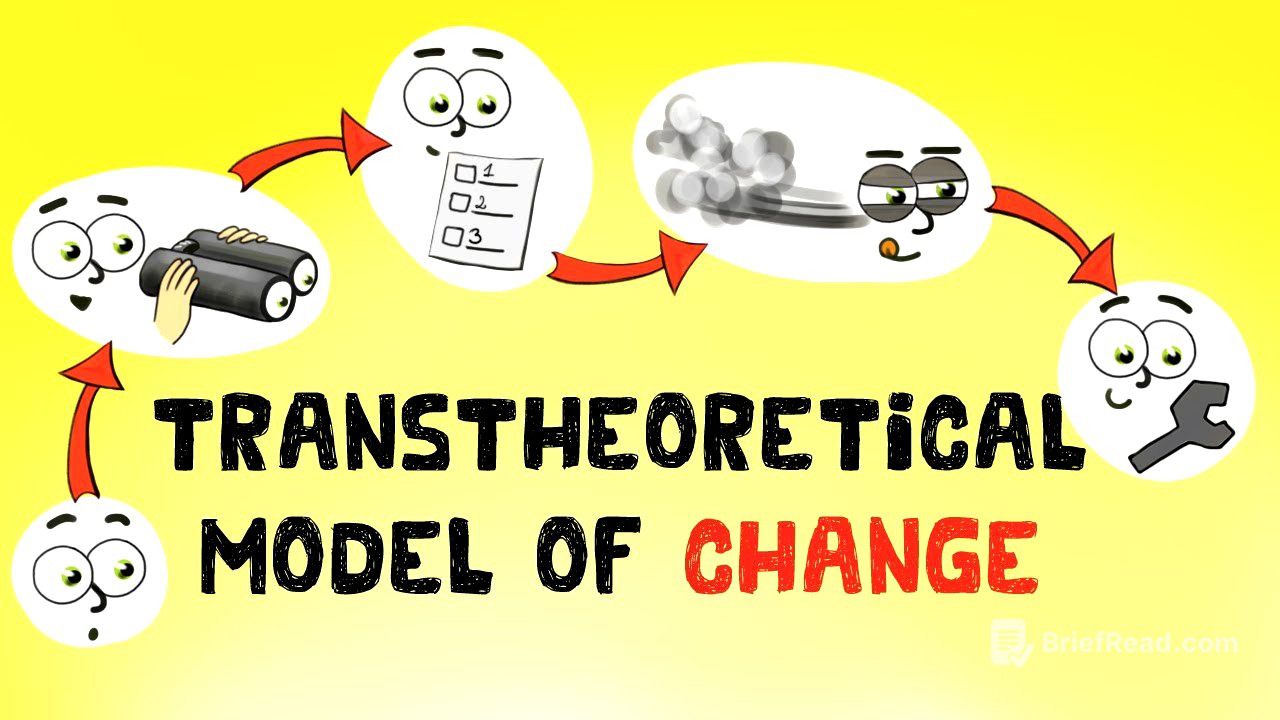TLDR;
This video explains the transtheoretical model of behavior change, a framework developed in the 1970s by James Prochaska and Carlo DiClemente. The model outlines six stages individuals go through when adopting new habits or changing existing ones: pre-contemplation, contemplation, preparation, action, maintenance, and relapse. Understanding these stages can help individuals and their loved ones navigate the process of change more effectively, fostering patience and realistic expectations.
- The model emphasizes that change is a process, not an event, and individuals may spend varying amounts of time in each stage.
- Relapse is a normal part of the process, and how one responds to it is crucial for long-term success.
- The first three stages (pre-contemplation, contemplation, and preparation) are crucial for building a solid foundation before taking action.
Introduction to the Transtheoretical Model [0:00]
The transtheoretical model, developed by James Prochaska and Carlo DiClemente in the 1970s, provides a roadmap for adopting new habits or changing behaviors. Research indicates that individuals who successfully navigate the first five stages of this model are more likely to achieve their goals and sustain positive habits. This model is applicable to various changes, such as quitting smoking or adopting a healthier lifestyle. Patience is key when supporting someone through these stages, as progress may be gradual.
Pre-contemplation Stage [1:30]
The pre-contemplation stage is the initial phase where individuals may not recognize the need for change or believe it's worth their effort. They tend to focus on the downsides of adopting a new habit and may downplay the benefits. Moving out of this stage requires introspection and a shift in perspective to recognize the long-term negative consequences of their current behavior.
Contemplation Stage [2:30]
In the contemplation stage, individuals begin to acknowledge the negative impacts of their actions and consider making a change within the next six months. However, they may remain in this stage for an extended period, often held back by a skewed perception of change as a loss of a part of their identity. Overcoming this requires identifying the factors holding them back and weighing the pros and cons of changing their behavior. Strategic thinking and validating readiness are crucial for moving forward.
Preparation Stage [3:52]
The preparation stage involves making small changes and preparing for a larger change within the next month. Individuals in this stage understand the benefits of change and are eager to move forward, often testing the waters to see what to expect. This phase is an opportunity to research potential obstacles, create SMART goals, and develop alternative plans of action. Thorough preparation increases the likelihood of success in the subsequent action and maintenance phases.
Action Stage [4:57]
The action stage is when individuals take concrete steps to change their behavior, such as quitting smoking entirely. The preceding stages of pre-contemplation, contemplation, and preparation provide a crucial foundation for this stage. Unlike New Year's resolutions that often fail due to a lack of preparation, the action stage requires a well-thought-out plan, support groups, and ongoing research. Rewarding successes is also important during this phase, which typically lasts three to six months.
Maintenance Stage [6:18]
The maintenance stage begins once an individual has sustained their changed behavior for at least six months. While relapse remains a possibility, individuals in this stage feel more confident in their ability to maintain the change. Temptations will continue to arise, so it's important to anticipate them and have strategies to avoid them. Acknowledging the possibility of relapse and planning for it is also crucial.
Relapse Stage [6:52]
Relapse is a common occurrence in the change process. The response to a relapse is critical in determining whether an individual stays in the model and continues to strive for change. Instead of shaming oneself, it's important to analyze the triggers that led to the relapse, identify the barriers faced, and use this information to move forward. Reconnecting with the insights from the first three stages of the transtheoretical model can help individuals start the process again.









